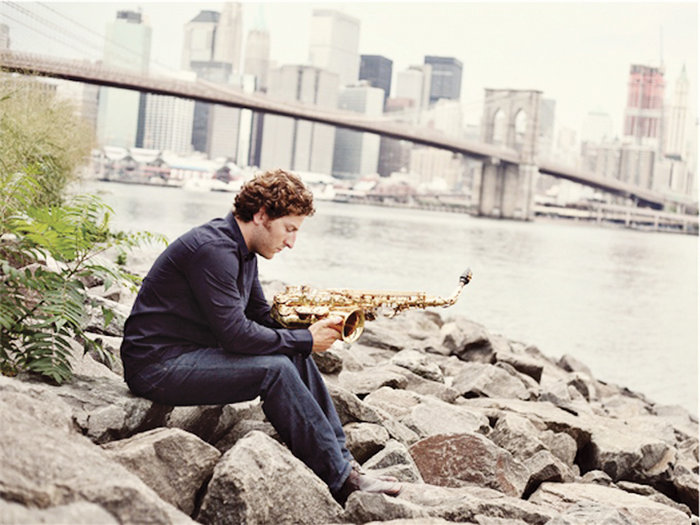The ubiquitous PATH Train system serves many functions. It is obviously a means of transport for millions of people who need to travel between New York and New Jersey. But it is also a meeting place, where strangers are as likely to share thoughts on books and film as they are opinions about the Jets and Giants.
For Russell Kirk, a sax player/composer and professional jazz musician, the PATH trains were for three years a place of meditation. During this period a few years ago he was studying music at New York University in pursuit of his master’s degree, and spending his nights listening to – and occasionally jamming with – some of the city’s top jazz musicians. After these gigs he would distill the experiences of the day on his PATH train commute back to the Journal Square condo he shared with his wife.
Like many people who make this journey each day, Kirk said he “had no intention of being in Jersey City and ended up there sort of by accident.”
A native of Baltimore, Kirk and his wife had originally planned to move to Brooklyn so he could attend NYU and she could pursue a professional career in the restaurant business.
‘Everything in Jersey City…is a big struggle. But with struggle comes great art.’ – Russell Kirk
____________
Kirk’s struggles to make ends meet while going to school and immersing himself in the New York-North Jersey music scene became the impetus for several strong compositions that he wrote during that period. The result is Kirk’s second CD, “To Journal Square,” a recording of original jazz tunes that were inspired by Jersey City and the years he spent pondering music on the PATH.
A metaphor
The album includes eight original compositions – fairly mellow and contemplative in mood – that feature Kirk and 10 top-tier jazz musicians who are well-known in the genre. The band featured on the album includes Grammy-winning musician Terri Lyne Carrington on drums. “To Journal Square” was co-produced by Kirk and Greg Osby.
The PATH (path), he said, is a metaphor for life itself.
“It was an interesting feeling [living in Journal Square],” said Kirk, who has a very slight Southern drawl to his accent. A Caucasian who was raised in predominantly African American Baltimore, he said, “There, everywhere I went, everything was 50/50, black and white. I’m a white guy playing jazz. I can play jazz with a group of black guys and not feel like a minority. But in Journal Square it was the first time I felt like a minority – and it was a very interesting feeling because there was all of this diversity. But it wasn’t the kind of diversity I was accustomed to.”
Homage to diverse community
The Journal Square community is home to many Arab immigrants, South Asians, and Latinos, and has been called the city’s most diverse municipal ward. “To Journal Square” is the second album recently to pay homage to this culturally rich community. Last year folk musician and Journal Square resident Robert Albrecht released “A Tale of Two Cities,” an album that traced the lives of working class people in Hoboken and Jersey City. The album included several songs that touched on life in and around the Journal Square of old.
Life’s path has taken Kirk back to his native Baltimore. When his wife was pregnant with their first son they made the decision to return south to be closer to family and medical services they felt more comfortable with.
But the couple still owns their Journal Square condo, which they rent out, and Kirk still returns to Jersey City periodically to deal with condo business.
“The jazz scene in New York and New Jersey is like no other jazz scene anywhere else – and they’re different,” Kirk reflected. “The jazz scene in Newark is not the same as the jazz scene in New York. But there’s a language they speak there and it was important for me to be a part of that, even if it was for a short time. Because now I can say I’ve had that exposure.”
For the moment, the family, which now includes two sons, has no intention of returning to Jersey City, said Kirk. But, he adds, “You never know. You never know where life’s path might take you.”
E-mail E. Assata Wright at awright@hudsonreporter.com.
